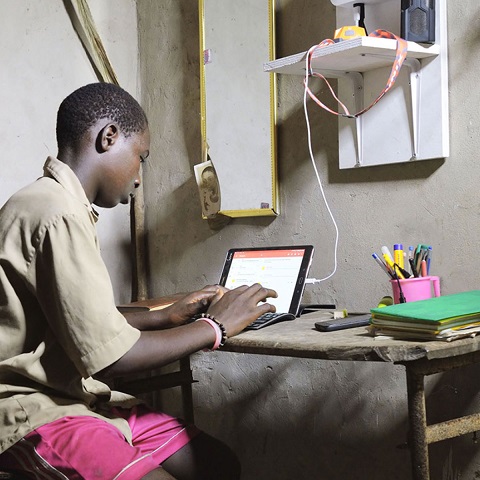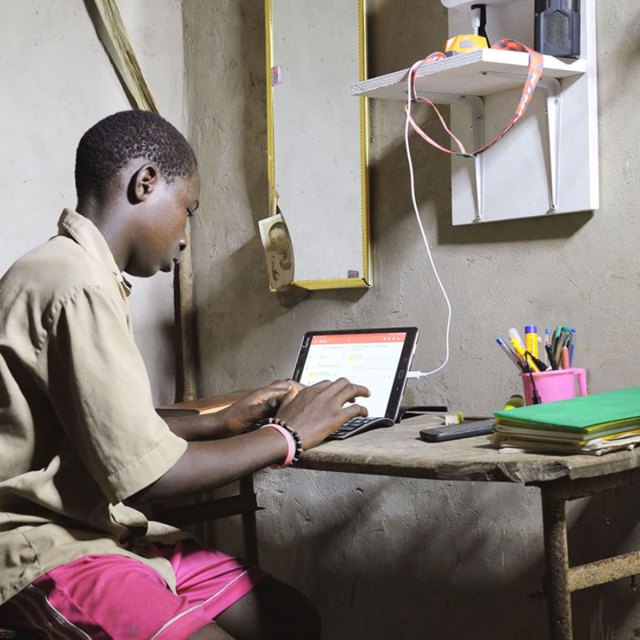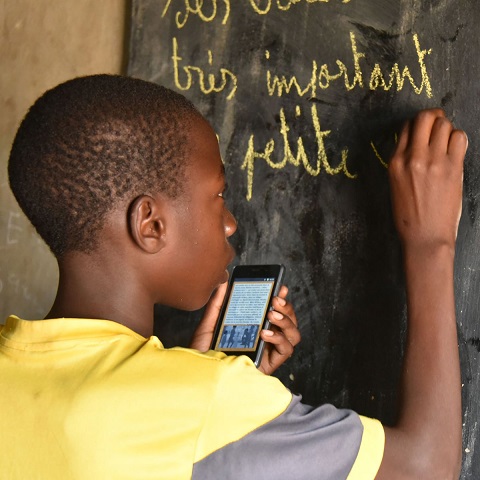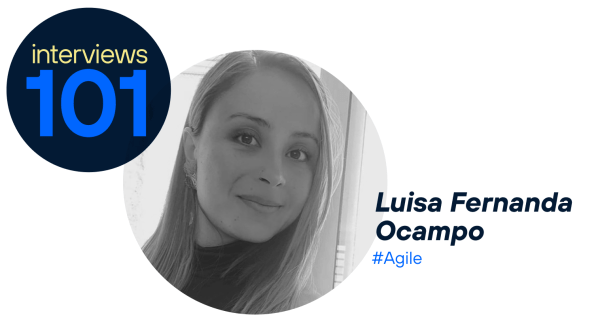TOMi and Moon win the 2nd call for entrepreneurs launched by Telefónica’s open innovation hub and the digital education programme of Fundación Telefónica and the “La Caixa” Foundation
- The winning startups have developed energy and digital inclusion solutions to enable children who study at schools without electricity or the internet to access digital educational resources.
- ProFuturo will seek channels for cooperation with TOMi and Moon to improve the implementation of its programme in the vulnerable environments it operates in to reduce the education gap.
- The call received a total of 26 proposals from Spain, France, the United Kingdom, Colombia, Mexico, Senegal, Equatorial Guinea and Uganda.
Madrid, February 24. The TOMi and Moon startups from Colombia and France have won the second global call for entrepreneurs launched by ProFuturo, the digital education programme promoted by Fundación Telefónica and the “La Caixa” Foundation, and Wayra, Telefónica’s open innovation hub. Their innovative projects offer energy and digital inclusion solutions to enable children who study at schools in remote areas to access digital educational resources.
ProFuturo, which seeks to narrow the education gap in the world by providing digital quality education to children in vulnerable environments in Latin America, the Caribbean, Africa and Asia, in some occasions implements its program in schools that do not have access to electricity and the internet. To improve its response in these situations, it will seek channels for cooperation with TOMi and Moon.
According to a report published last September by UNESCO, UNICEF and ITU (International Telecommunication Union), 46.4 per cent of the world’s population has no connection to the internet[1]. Meanwhile, 789 million people in the world still live without electricity[2], according to the latest data provided by the World Bank.
The French startup Moon offers a solution for people with few resources and no electricity connection consisting of a photovoltaic solar kit and a smartphone with low-data-consumption apps. These can be used both online and offline, providing access to digital services such as educational resources from the Khan Academy and the YouScribe virtual library. The kit includes a solar panel connected to a battery with which the phone and three LED lamps can be charged. The project, which is being implemented in southern Senegal, seeks to contribute to the energy, digital and financial inclusion of one million Africans by 2023.
As for TOMi, it has developed a digital platform that allows teachers to create virtual interactive lessons based on activities and contents from an open bank of educational resources, and to teach them to their pupils at school, even if there is no internet connection. To do so, it has created a wireless electronic device to simulate a Wi-Fi network in the classroom to which students synchronise their computers, tablets and phones.
In this virtual environment, students can interact with each other and compete in the resolution of exercises presented by the teacher in an enjoyable way by means of wordsearch puzzles, multiple choice questions and activities for associating concepts. The device has a sensor that turns any surface into a touch screen. This enables to project the exercises on a board or wall, allowing students who don’t have a computer, tablet or smartphone to take part in the lesson. TOMi’s digital solution is already used in 200 cities in ten Latin American countries.
Gamification and mental training
The call received a total of 26 proposals from Spain, France, the United Kingdom, Colombia, Mexico, Senegal, Equatorial Guinea and Uganda. The initiatives that reached the final include projects that use gamification and mental training to support the learning of subjects such as mathematics, spelling and science, and improve reading comprehension. Most of them offer adaptive learning to the students and enable the teachers to monitor their performance. Some proposals are also geared towards teacher training.
This is the second time that ProFuturo and Wayra have launched a call to identify innovative projects that help to address the technological and educational challenges faced by the programme run by Fundación Telefónica and the “La Caixa” Foundation in vulnerable environments in the 40 countries in which it operates.
About ProFuturo
ProFuturo is a digital educational programme created by Fundación Telefónica and the “La Caixa” Foundation to reduce the educational gap in the world by providing high-quality digital education for boys and girls in vulnerable environments in Latin America, the Caribbean, Africa and Asia. Since its creation in 2016, ProFuturo has reached 40 countries, benefited 16 million girls and boys and trained more than 600,000 teachers. Its goal is to provide the best education to 25 million children by 2030.
ProFuturo relies on technology and innovative teaching methodologies to help teachers and pupils to develop competences to address the challenges of the 21st century. The programme works with other institutions and companies, aspiring to create a large international network of centres that teach, learn and share knowledge in order to jointly achieve better education around the world.
Further information available at: https://profuturo.education/
About Wayra
Wayra is the entrepreneurship initiative part of Telefónica’s Open Innovation programme, the most global, technological and connected in the world. It has seven Wayra Hubs, spaces in nine countries in Latin America and Europe through which it invests in and supports startups; Wayra X, a digital hub to invest in 100% digital startups; Wayra Builder, a corporate venture builder to create, together with other investors, innovative startups born from Telefónica’s internal technology projects; and Wayra Next Trend, a window to digital innovation on innovative trends and applications. In addition, through the Wayra Activation Programme, it offers entrepreneurs exclusive and free access to new technologies through Telefónica’s own platforms. More than 500 of the startups invested are part of Telefónica’s Open Innovation programme and more than 130 are doing business with the company.
More information available at https://www.wayra.com/
[1] Broadband Commission for Sustainable Development, International Telecommunication Union, UNESCO and United Nations Children’s Fund, The digital transformation of education: connecting schools, empowering learners, September 2020
[2] The World Bank, Understanding Poverty, Energy Overview, 13 July 2020









